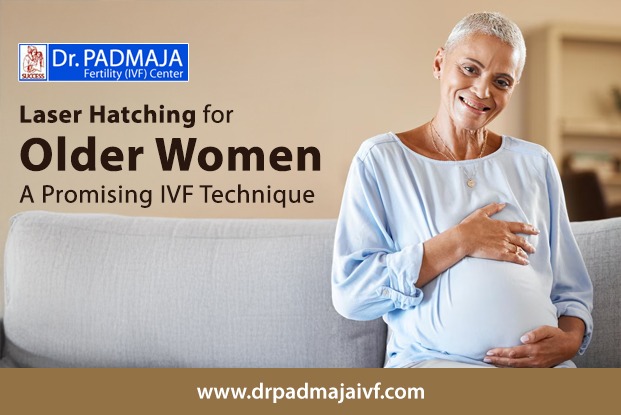Fertility can become more challenging with age, especially for women over 35. As women grow older, the chances of conceiving naturally or even through IVF (In Vitro Fertilization) start to decline. One of the major concerns is the embryo’s ability to implant successfully in the uterus. That’s where laser-assisted hatching, a cutting-edge IVF technique, comes into play.
A novel technique for improving the likelihood of successful embryo implantation, especially in older women, is laser hatching. At trusted clinics like the Dr Padmaja IVF Center, this technique has been giving new hope to women who dream of starting or expanding their families, even in their late 30s or 40s.
What Is Laser Hatching?
Laser-assisted hatching is a specialized laboratory technique used during IVF. In a natural pregnancy, an embryo has to “hatch” from its outer shell (called the zona pellucida) before it can implant itself into the uterine wall. This outer layer may be too thick or rigid in certain situations, particularly in older women, which makes it more difficult for the embryo to penetrate.
Laser hatching involves using a highly precise laser beam to create a tiny opening in this shell, helping the embryo hatch more easily and improving its chances of implanting in the uterus.
This process is quick, safe, and does not harm the embryo. At renowned fertility treatment centers in Hyderabad like DrPadmaja Fertility Center, laser-assisted hatching is often recommended for women over 35, women with previous IVF failures, or those using frozen embryos.
Why Is Laser Hatching Important for Older Women?
As women age, their eggs undergo natural changes, which can affect embryo quality and implantation success. The zona pellucida becomes tougher and less flexible, making it difficult for the embryo to break free and implant naturally.
Laser hatching addresses this issue by giving the embryo a better chance at attaching to the uterus—an essential step for a successful pregnancy.
At the best fertility centre in Hyderabad, including the Dr Padmaja IVF Center, specialists carefully assess the patient’s age, egg quality, and past IVF history before recommending laser hatching. The probability of a successful outcome is greatly increased by this customized strategy.
When Is Laser Hatching Recommended?
Laser-assisted hatching is especially beneficial in the following situations:
Women over 35 years of age
Couples with multiple failed IVF cycles
Thick or hardened zona pellucida (embryo outer shell)
Frozen embryo transfer (FET) cycles
Poor embryo development in earlier IVF cycles
At DrPadmaja Fertility Center, fertility experts use advanced technology and detailed assessments to decide when laser hatching should be used. The goal is always to optimize each patient’s chances of pregnancy in a safe and effective way.
Benefits of Laser Hatching
Laser-assisted hatching is gaining popularity at many fertility treatment centers in Hyderabad, thanks to its many potential benefits:
Improves embryo implantation rates
Especially useful for older women or those with previous IVF failures
Safe and precise technique with minimal risk
Boosts the success of frozen embryo transfers
To enhance the results, especially in more difficult situations, the top IVF hospital in Hyderabad frequently incorporates laser hatching into IVF cycles.
Why Choose Dr Padmaja IVF Center?
If you’re exploring fertility options and want the best care, Dr Padmaja IVF Center is a name you can trust. Recognized as one of the best fertility centres in Hyderabad, this clinic is known for its high success rates, experienced team, and advanced reproductive technologies.
Here’s what makes DrPadmaja Fertility Center a preferred choice for many hopeful parents:
Expertise in Laser Hatching and other advanced IVF techniques
Highly experienced fertility specialists and embryologists
Personalized treatment plans tailored to individual needs
Affordable and transparent pricing
World-class laboratory and facilities
Whether you are just starting your fertility journey or have had unsuccessful attempts in the past, the team at Dr Padmaja IVF Center offers compassionate care, emotional support, and the latest treatments to help make your dream of parenthood a reality.
Final Thoughts
For older women trying to conceive, laser-assisted hatching represents a significant advancement in reproductive medicine. It’s a simple yet powerful technique that can dramatically improve embryo implantation and IVF success rates, especially when age or previous failures pose a challenge.
Choosing the right fertility clinic is just as important as choosing the right treatment. At the best IVF center in Hyderabad, like Dr Padmaja IVF Center, you can rest assured you’re getting the highest standard of care backed by years of experience and innovation.
If you’re considering IVF or struggling with repeated IVF failures, it might be time to explore how laser-assisted hatching can help. Reach out to DrPadmaja Fertility Center today to schedule a consultation and take one step closer to your parenthood dreams.
About the Author

This blog is penned by a devoted content specialist passionate about raising awareness around fertility treatments and emotional well- being. With in- depth disquisition on motifs like IVF and fertility, the thing is to give precious perceptivity for couples on their trip to parenthood.
Frequently Asked Questions (FAQs)
- What is laser-assisted hatching in IVF?
Laser-assisted hatching is an advanced IVF technique where a laser is used to thin or create a small opening in the zona pellucida (the outer shell of the embryo) to help it hatch and implant more easily in the uterine lining.
- Why is laser hatching recommended for older women?
As women age, particularly over the age of 35, the zona pellucida can become tougher and less elastic, making it harder for the embryo to hatch naturally. Laser-assisted hatching helps overcome this barrier and increases the chances of successful implantation.
- At what age is laser hatching usually suggested during IVF?
It is most commonly recommended for women over 35 or those who have had previous failed IVF cycles. It may also be suggested for women with poor embryo quality or those using frozen-thawed embryos.
- How does laser hatching work?
A highly precise laser beam is used to make a tiny hole or weaken a portion of the embryo’s outer shell. This procedure is typically done just before the embryo is transferred into the uterus.
- Is laser-assisted hatching safe?
Yes, when performed by skilled embryologists, laser-assisted hatching is considered safe and causes minimal stress to the embryo. The technique is non-contact, precise, and offers more control than other hatching methods like chemical or mechanical approaches.
- Does laser hatching improve IVF success rates for older women?
Studies suggest that laser hatching can improve implantation and pregnancy rates in older women by assisting embryos in the hatching process. However, success depends on many factors, including overall embryo quality, uterine health, and individual medical history.
- Can laser hatching harm the embryo?
When done correctly, the risk of damage is very low. Laser hatching is a controlled, minimally invasive procedure. However, as with any manipulation of the embryo, there is a small risk, which should be discussed with your fertility specialist.

